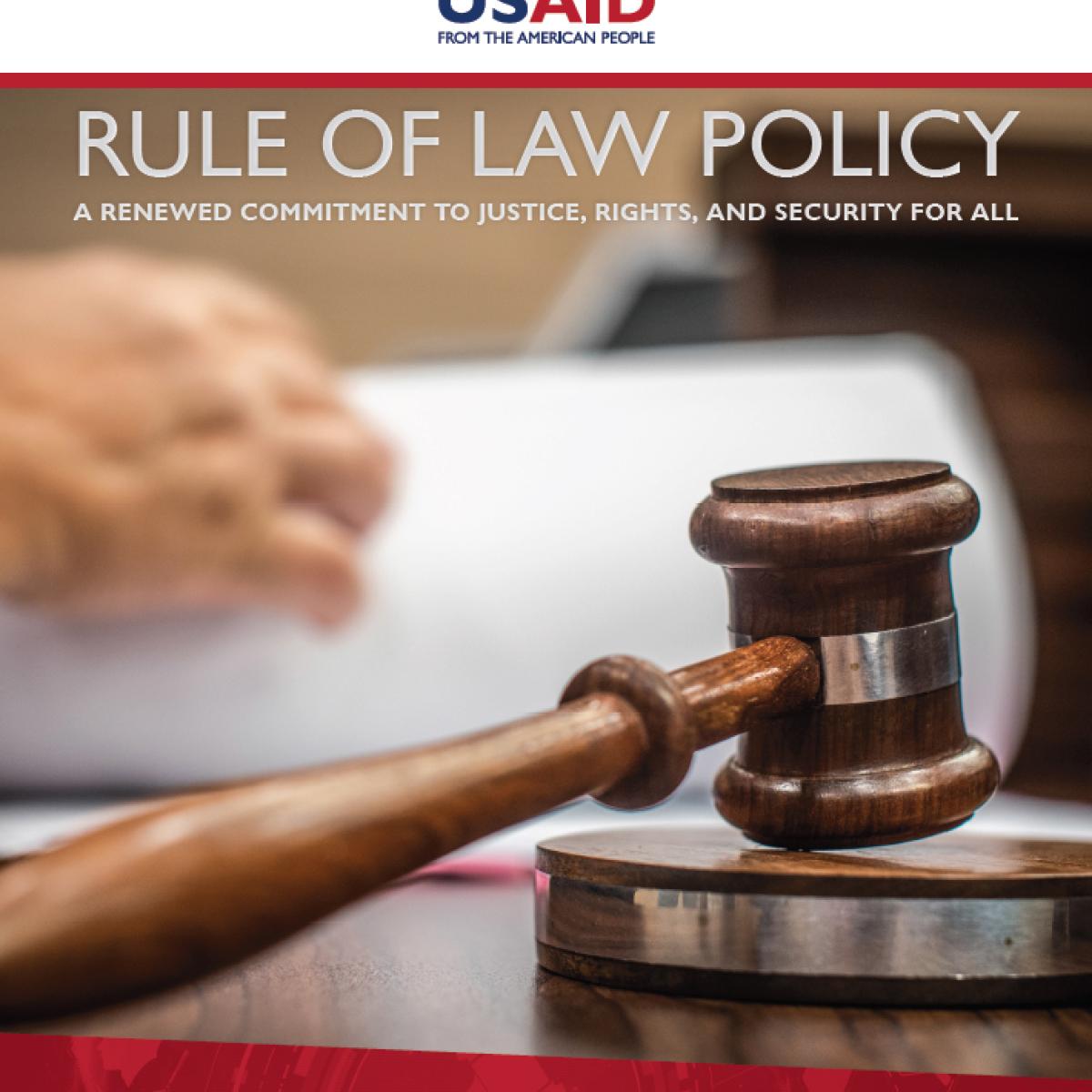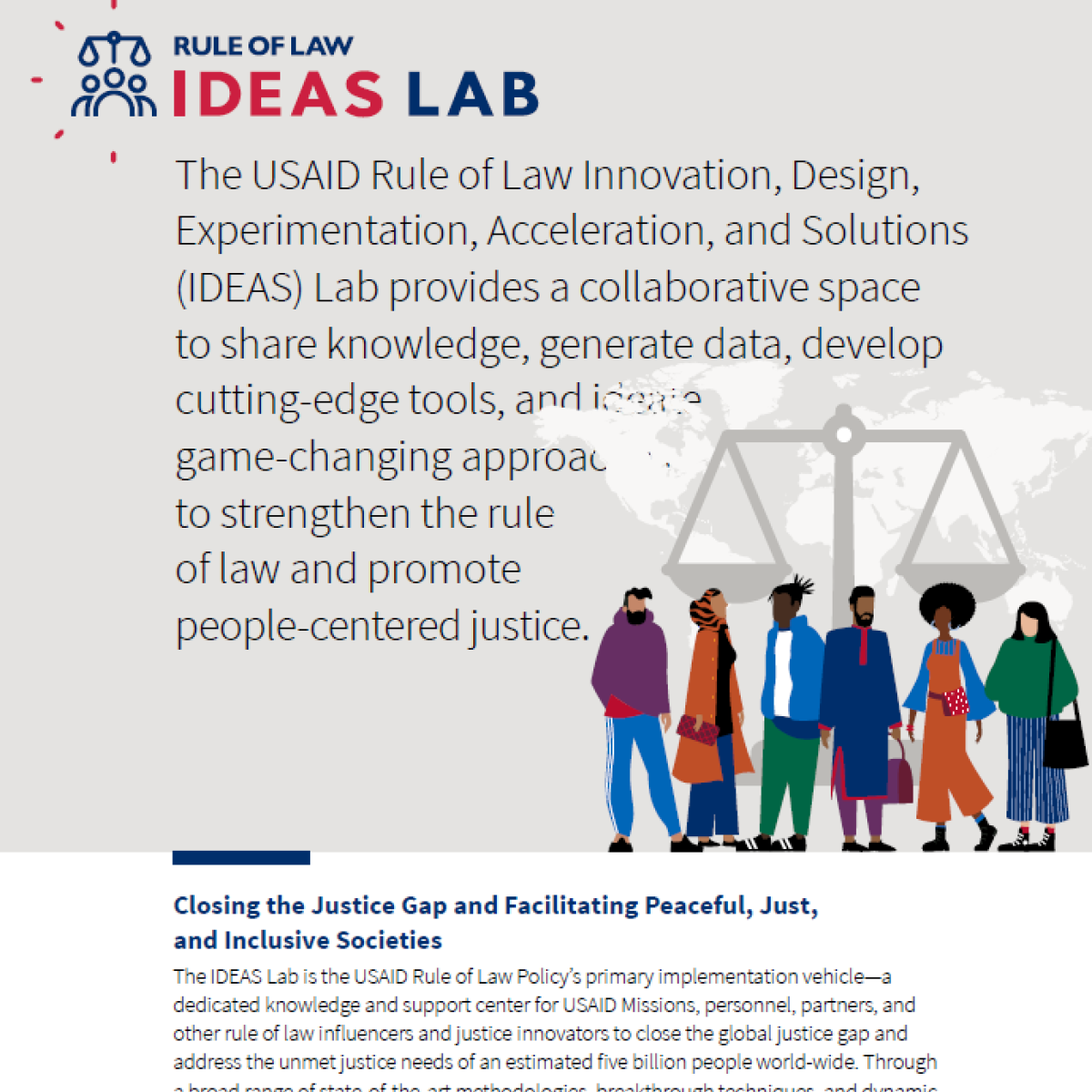Rule of Law
USAID continues to promote the rule of law as an enduring priority of our development efforts, advancing justice, rights, and security for all.
The Rule of Law is fundamental to USAID’s development mission and serves as a foundation for democracy, guardrail of good governance, and facilitator of inclusive economic growth.
USAID believes that the basic premise of the rule of law is that no one is above the law, and that the law “rules” through public and legitimate laws that apply to everyone. Without the rule of law, autocracy, corruption, impunity, discrimination, and a host of other societal ills go unchecked and unpunished.
Without the rule of law to check corruption, elites gain priority access to public social goods, such as healthcare or education. Without the rule of law to guard against impunity, the rights and freedoms of society’s most vulnerable go unprotected. Without the rule of law, access to economic opportunity is available only to the connected few able to game the system. The rule of law is not just linked to, but necessary for, every other development goal.
With the April 2023 adoption of the first-ever U.S. government Rule of Law Policy, USAID renewed the Agency’s commitment to promoting rule of law. The Policy sets forth a new paradigm for rule of law programming known as people-centered justice, which places the person affected by the law at the core of the policies, processes, and practices that constitute justice systems and services.
Promoting the rule of law has long meant improving the independence, accountability, transparency, and efficiency of justice and related institutions, and now we are working to transform these institutions, the services they provide, and their operating systems to be more data-driven, user-friendly, and problem solving.
Through the Rule of Law Innovation, Design, Experimentation, Acceleration, and Solutions (IDEAS) Lab, USAID also provides a provides a collaborative space to share knowledge, generate data, develop cutting-edge tools, and ideate game-changing and innovative approaches to strengthen the rule of law and promote people-centered justice.
Rule of Law Resources
- Rule of Law Policy
- Rule of Law Achievements Review, 2005-2020
- Rule of Law Terrain Analysis: A Literature Review
- Rule of Law Evidence Gap Map (2022)
- Rule of Law Practitioner's Guide (2020)
- Designing and Implementing Court Automation Projects Guide (2019)
- Non-State Justice System Programming: A Practitioners’ Guide (2019)
- Guide to Rule of Law Country Analysis: The Rule of Law Strategic Framework (2010) [pdf]
Illustrative Rule of Law Activities
Examples of USAID rule of law programming can be found in the Rule of Law Achievements Report 2005-2020 that highlights achievements based on an analysis of 340 activities in 83 countries and focusing on activities in 16 countries. These lessons help USAID to re-envision rule of law programming to meet contemporary challenges, particularly the critical links with other areas of development, such as global health, climate change, economic development, gender equality, and labor rights.
Ghana: USAID assistance enabled the Ghanaian judiciary to gain greater control over its funding and to continue to regularly advocate for increased resource allocations. Judicial officers now justify and defend allocations before the relevant parliamentary committees. Also, the judiciary continues to increase its ability to conduct judicial review and legislative oversight, engaging with the Parliament and the Ghana Audit Service.

Photo credit - ghanaweb.com
South Africa: USAID’s support empowered sexual and gender-based violence (SGBV) victims, including programs for child witness preparation, and raised public awareness across the country through education campaigns in schools. USAID strengthened civil society’s capacity to oversee court processes and judicial decisions on SGBV and supported the development of a uniform information reporting and record keeping system for non-governmental organizations to support advocacy for victims and improve government response.

Photo: USAID Southern Africa DOC
Justice Innovators and Rule of Law Influencers Video Platform

View USAID personnel from around the world share how they are reimagining rule of law and people centered justice.
Colombia: USAID was instrumental in Colombia’s efforts to establish a new adversarial criminal justice system. A new criminal procedure code in 2002 and a series of other laws enacted during 2005-2020 have helped to make the administration of criminal justice more efficient, transparent, and equitable. USAID technical assistance helped Colombia implement new systems, modernize justice institutions, and expand reform from the national to sub-national (departmental) and municipal levels.

Photo: USAID/Colombia
Indonesia: USAID supported the Indonesian Supreme Court’s “Long Blueprint,” a strategy for administrative and transparency-related reforms across the judiciary. Capitalizing on local knowledge and expertise, USAID supported the development of a series of Indonesian-led strategic plans to improve the Anti-Corruption Court, the Commercial Court, and the Supreme Court. The Blueprint process used data from the Central Statistics Agency to strengthen judicial career paths. Judiciary leaders developed standards for digital information dissemination and today judges demonstrate greater commitment to transparency, regularly posting decisions and other court data online.

Photo: Ruth Panjaitan for USAID
Georgia: USAID has supported civic organizations and legal professional institutions to build community awareness of and trust in the justice system. A core focus has been ensuring courts are responsive to the legal needs of the community, providing a people-centered justice approach. By partnering with courts and legal professionals, USAID has supported efforts to expand court-community engagement practices using examples from around the world.

Photo courtesy USAID Promoting the Rule of Law in Georgia project



